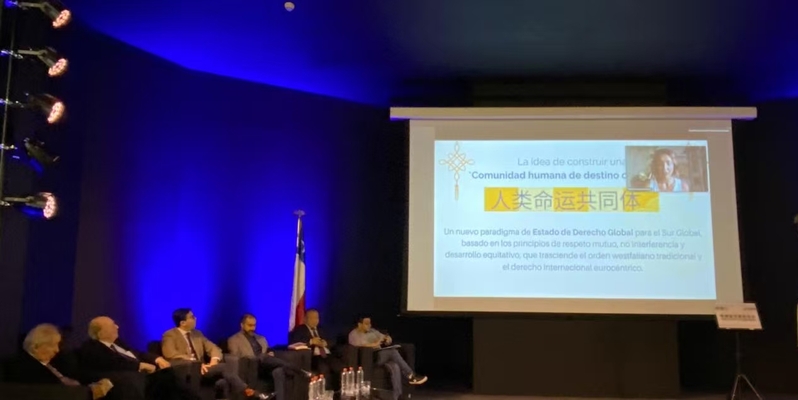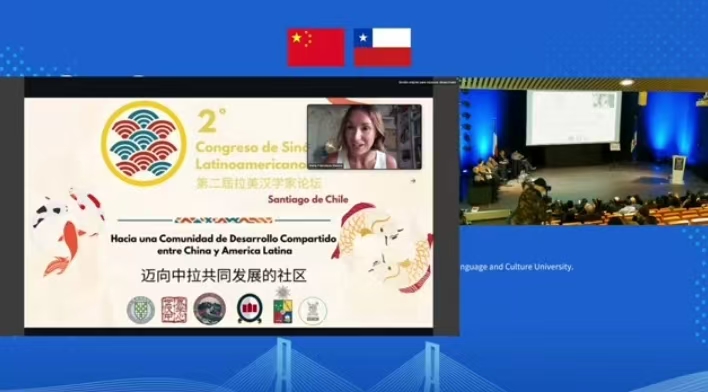Santiago, Chile – August 2, 2025. Professor Maria Francesca Staiano, Director of the Latin American Research Academy on Community with a Shared Future for Mankind and the Belt and Road Initiative (CUC-IRI/UNLP), participated as a featured speaker in the Closing Plenary Panel of the 2nd Latin American Sinology Congress, held from July 31 to August 2 in Santiago, Chile. Her presentation, titled “The Human Community with a Shared Future: A New Legal Paradigm for a Global Rule of Law”, offered a compelling and timely contribution to the global academic debate on the future of international governance.

Organized by the World Center for Sinology of the Beijing Language and Culture University, together with the Sinolatinoamerican Council, the Universidad Andrés Bello, the Universidad de Chile, and the Universidad de Santiago de Chile, the Congress brought together renowned scholars, diplomats, policy experts, and business leaders to discuss the deepening of academic and strategic relations between China and Latin America. The event coincided with the 55th anniversary of China–Chile diplomatic relations and the 20th anniversary of their Free Trade Agreement.
In her address, Professor Staiano emphasized that the vision of a Community with a Shared Future for Mankind, first articulated by Chinese President Xi Jinping, carries transformative potential for the legal architecture of the international system. “This concept invites us to reconceive international law,” she stated, “not simply as a mechanism for managing national sovereignty, but as a relational and inclusive structure rooted in mutual respect, shared development, and global justice.”
According to Staiano, the emergence of a Global Rule of Law, inspired by the Chinese approach to global governance in the New Era, demands the recognition of legal pluralism as a foundation of international cooperation. Drawing on both relational philosophy and civilizational dialogue, she proposed a new framework that integrates diverse legal traditions to promote peaceful coexistence, collective well-being, and sustainable development. “A truly global legal order must include the voices of the Global South,” she noted, “not as peripheral inputs, but as central building blocks of a more equitable international system.”
Staiano’s participation marked a significant moment in the Congress, bridging European academic perspectives with those of Latin America and China. As Coordinator of the China Studies Center at the Institute of International Relations of the National University of La Plata (IRI-UNLP), she has long been committed to fostering triangular cooperation and knowledge exchange between China, Latin America, and Europe. Her leadership of the Latin American Research Academy on the Community with a Shared Future and the Belt and Road Initiative has further consolidated her role as a leading voice in the legal and diplomatic dimensions of South–South cooperation.
The Closing Panel, streamed live and widely disseminated through academic networks and media platforms, included prominent figures such as Professor Xu Baofeng, President of the World Center for Sinology at BLCU; Elias Marco Khalili Jabbour from Brazil’s Urban Planning Institute of Rio de Janeiro; Luis Schmidt Montes, former Chilean Ambassador to China; and Sabino Vaca Narvaja, President of the Sinolatinoamerican Council.
Over the course of three days, the Congress hosted more than 100 experts and practitioners from across China, Latin America, Europe, and India. Topics ranged from South–South geopolitics and intercultural dialogue to Chinese language education, higher education cooperation, and innovative approaches to local governance. Sessions were held at the National Library of Chile, the Universidad Andrés Bello, the Universidad de Chile, and the Universidad de Santiago de Chile, reflecting the depth and diversity of institutional support for the initiative.

In her concluding remarks, Professor Staiano called for renewed efforts to build an inclusive and human-centered international legal order, grounded in intercultural dialogue and shared responsibility. “Building a Community with a Shared Future,” she said, “requires legal innovation and the courage to move beyond unilateral paradigms. It is not only a geopolitical vision—it is a normative project that places humanity at the center of global governance.”
Her address underscored the growing significance of legal scholarship in shaping the next generation of global governance norms, particularly in times of fragmentation, uncertainty, and power shifts. The Latin American Sinology Congress reaffirmed the critical role of cultural, academic, and legal exchanges in constructing meaningful alternatives to exclusionary models of development and law.
With her thought-provoking contribution, Professor Staiano reinforced her position as one of the foremost legal scholars promoting a global South-centered approach to law, development, and international cooperation.
Watch the Congress video here: https://m.youtube.com/watch?v=ButW_yJ9rn4
